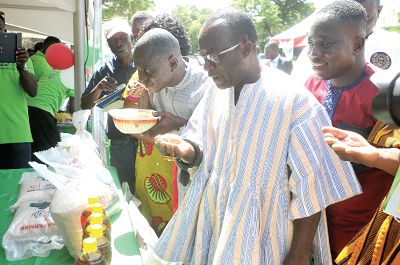
National Rice Festival celebrated in Accra
Local rice farmers have called for the appropriate incentives to be given to farmers to enable them to expand their farms.
The appeal follows reports that there is high demand for local rice in the country, but since 2016 farmers and actors in the value chain have not been able to meet the market demand.
Rice Festival
The President of the Ghana Rice Inter-professional Body (GRIB), Nana Agyei Ayeh II, made the call at the fifth Ghana National Rice Festival held in Accra on Friday.
It was on the theme: "Invest in rice production for self-sufficiency".
On display at the event were a variety of rice, fertiliser, improved seeds, agro-chemicals, modern farming equipment and other inputs.
It was attended by rice farmers, actors in the value chain production of rice and members of the GRIB and designed to bring rice farmers and input dealers together to network towards improving the rice industry in the country.
The festival also served as an advocacy tool to further promote the consumption of local rice.
Increased consumption
According to Nana Agyei Ayeh II, marketers of local rice all over the country attested to the fact that its demand had exceeded supply for some time now, as they had continuously recorded shortages in their shops since 2016.
"The fascinating issue is that production has increased over 200 per cent in the last decade, yet supply shortfall is over 40 per cent to meet the market demand," he said.
Incentives
On the incentives that would be appropriate for rice farmers, Nana Agyei Ayeh II identified access to credit and the provision of mechanisation services as necessary for farmers to increase rice production in the country.
He said to be able to achieve self-sufficiency, players in the sector needed concessionary financing and at a single digit to reduce the high cost of agricultural credit.
That, he added, would make the sector competitive and more attractive to stakeholders and investors.
He said the incentives would motivate the farmers to "intensify production by adopting tried-and-tested technology of systems of rice intensification (SRI) to increase yield and boost production by at least 50 per cent.
Nana Ayeh II also called for mechanised and irrigation farming as part of the effort to achieve self-sufficiency, explaining that about 85 per cent of rice produced in Ghana was rain fed and as a result farmers did production once a year.
According to him, when proper attention was given to rice production, it would reduce the unemployment rate by 20 per cent and improve the standard of living among the teeming youth both in the urban and the rural areas.
Furthermore, Nana Ayeh II appealed to the government to introduce ‘agriculture insurance’ as a form of guarantee for farmers to help grow the industry.
"With the introduction of ‘agriculture insurance’, financial institutions will have the confidence to make credit available to farmers,” he said, adding that that should be complemented with irrigation to reduce the risk in production.
Deputy Agric Minister
The Deputy Minister of Food and Agriculture in charge of Annual Crops and Animal Husbandry, Dr Bambangi Sagre, expressed excitement at the number of the value chain actors present.
He corroborated the fact that even though local rice production was increasing, the volumes produced did not meet demand, stressing that there was a high demand for locally produced rice.
Dr Sagre explained that the inability of rice farmers to meet demand was due to poor yields, since most of the farmers continued to use unimproved seeds.
Initiatives
He outlined a number of initiatives the government was putting in place to address food sufficiency and food security and mentioned the 50 per cent subsidy on fertiliser and improved seeds as an initiative by the government to help farmers improve on their yields.
He said the government was liaising with the World Bank to provide dams that would support rice production in the country.
Dr Sagre said, for instance, that the government was looking at the Tolon Irrigation Dam and other identified dams to ensure all-year round rice farming in the country.